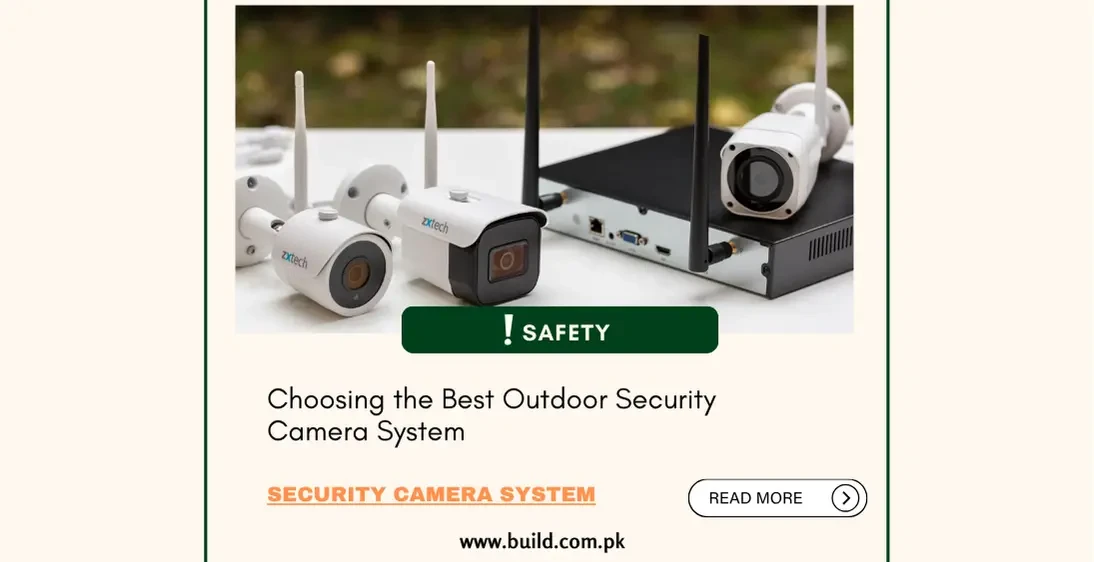Choosing the Best Outdoor Security Camera System

Introduction:
Ensuring
the safety and security of your home has become increasingly important in
today’s world. Outdoor security camera systems are an essential component of a
comprehensive home security strategy, offering peace of mind and protection
against potential threats. With a myriad of options available, selecting the
best outdoor security camera system can be a daunting task. This detailed guide
covers the key features, top brands, and critical factors to consider, helping
you make an informed decision to safeguard your property effectively.
Key Features to Look for in Outdoor Security Camera Systems
Video Quality:
The clarity of the video footage is paramount in a security camera.
High-resolution cameras, such as those offering 1080p or 4K resolution, provide
crisp and detailed images, which are crucial for identifying faces, license
plates, and other significant details. Higher resolution ensures that you can
zoom in on the footage without losing clarity, making it easier to distinguish
important features. Additionally, consider cameras with HDR (High Dynamic
Range) capability, which enhances image quality in varying lighting conditions,
ensuring clear footage even in bright or dark areas.
Weather Resistance:
Since outdoor cameras are exposed to the elements, they must be
built to withstand various weather conditions, including rain, snow, and
extreme temperatures. Look for cameras with a high IP (Ingress Protection)
rating, such as IP65 or higher, indicating their resistance to dust and water.
Robust housing materials like metal or durable plastic further ensure the
longevity and reliability of the camera in harsh weather conditions.
Night Vision:
Effective surveillance doesn’t stop when the sun goes down.
High-quality night vision capabilities are essential for capturing clear
footage in low-light or complete darkness. Infrared (IR) LEDs are commonly used
in security cameras to provide night vision. Cameras with a greater number of
IR LEDs or advanced technologies like color night vision offer superior
performance, allowing you to monitor your property around the clock.
Field of View:
The field of view (FOV) of a camera determines how much area it can
cover. A wider FOV means a single camera can monitor a larger area, reducing
the number of cameras needed for comprehensive coverage. Wide-angle lenses,
typically ranging from 120 to 180 degrees, are ideal for covering expansive
outdoor spaces like driveways, front yards, and backyards.
Motion Detection:
Advanced motion detection technology enables cameras to identify and
alert you to unusual activity. Look for cameras with customizable motion zones,
which allow you to define specific areas to monitor for movement, reducing
false alarms caused by non-threatening movements like swaying trees or passing
cars. Some systems also include AI-powered human detection, which can
differentiate between people, animals, and objects, further minimizing
unnecessary alerts.
Storage Options:
Security camera systems typically offer two types of storage: local
and cloud. Local storage involves saving footage on a memory card, DVR (Digital
Video Recorder), or NVR (Network Video Recorder) within your home. This method
provides immediate access to footage but can be vulnerable to damage or theft.
Cloud storage saves footage to an online server, offering remote access and
additional security. Many systems provide a combination of both, allowing for
flexible storage solutions.
Connectivity:
Reliable connectivity is crucial for real-time monitoring and alerts. Wireless
cameras offer easier installation and flexible placement options but rely on a
strong Wi-Fi signal for optimal performance. Wired cameras, while requiring
more extensive installation, provide a stable and uninterrupted connection.
Consider the layout of your property and the strength of your Wi-Fi network
when choosing between wired and wireless options.
Two-Way Audio:
Cameras equipped with two-way audio allow you to communicate with
visitors or potential intruders through the camera. This feature is useful for
instructing delivery personnel, deterring suspicious activity, or conversing
with family members or pets. Ensure the camera has a clear and loud speaker as
well as a sensitive microphone for effective communication.
Smart Home Integration:
Compatibility with smart home systems, such as Amazon Alexa,
Google Assistant, or Apple HomeKit, enhances the functionality of your security
camera system. Integration allows you to control the cameras using voice
commands, view footage on smart displays, and create automated routines that
increase the overall security and convenience of your home.
Factors to Consider When Choosing an Outdoor Security Camera System
Installation Requirements:
Evaluate your property’s layout and determine the best locations
for camera placement. Consider factors like power sources, Wi-Fi signal
strength, and potential obstructions. Wireless cameras offer easier
installation but may require periodic battery changes, while wired cameras
ensure a stable connection but involve more complex installation.
Budget:
Outdoor security camera systems vary widely in price, from budget-friendly
options to high-end models with advanced features. Determine your budget and
prioritize features that are most important to you, such as video quality,
smart home integration, and storage options.
Subscription Plans:
Some security camera systems offer additional features through
subscription plans, such as extended video storage, advanced motion detection,
and AI capabilities. Evaluate the cost and benefits of these plans to determine
if they are worth the investment.
Customer Support and Warranty:
Choose a brand known for excellent customer support and
comprehensive warranties. Reliable customer service can assist with
installation, troubleshooting, and maintenance, ensuring your security system
remains effective and operational.
User Reviews:
Research user reviews and ratings to gain insights into the
performance, reliability, and ease of use of different security camera systems.
Real-world experiences can help you make a more informed decision and avoid
potential pitfalls.
Conclusion:
Choosing the best outdoor security camera system involves careful consideration of various features, brands, and factors to ensure optimal protection for your property. By understanding the key features to look for, exploring top brands and models, and evaluating your specific needs and budget, you can select a security camera system that offers peace of mind and enhances the safety of your home. Embrace the power of modern technology to create a secure and vigilant environment, safeguarding your loved ones and belongings with confidence.









